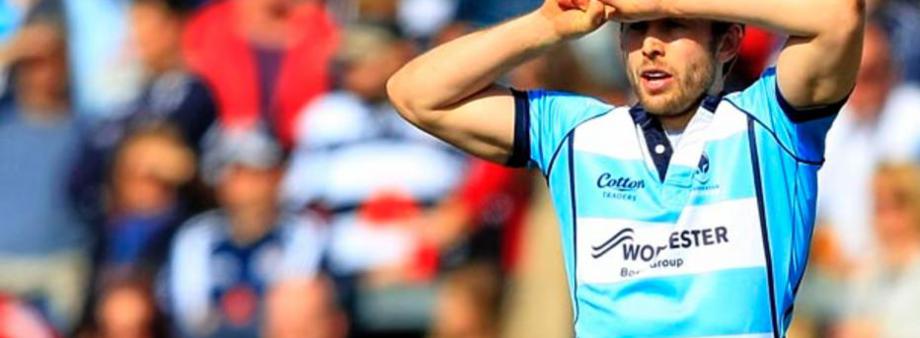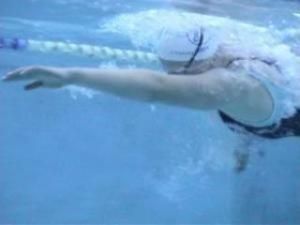
Race Swimming
Lindsey Ross
Lindsey is a 16 year old who has had type 1 diabetic for 10 years.
Her particular speciality is the 200-400 metre front crawl. She is noticing the typical problems of the diabetic athlete, namely, wild fluctuations in blood sugars during and post-training, post-event and loss of power after 4-5 minutes in her 400-metre discipline.
Training
Lindsey's training is typical for race swimmers
Monday - wakes at 5.30 in the morning and eats approximately 40 gm of carbohydrate in the form of toast, banana and yoghurt. She then trains for 2 hours at distance endurance training with a heart rate of about 160-170. This is typical of aerobic exercise. She supports her exercise appropriately by 30 gm of glucose in the form of Lucozade powder during the exercise. She immediately has 2 units of insulin with 15 gm of carbohydrate and by 8.00 am, she then has her breakfast with 60 gm of carbohydrate in the form of porridge with 8-10 units of Humalog. Her blood sugars remain constant throughout this period. She has a further snack at 11.00 am with 15 gm of carbohydrate in the form of fruit without any insulin. She has 30-40 gm of carbohydrate at lunchtime with 9-10 units of Humalog insulin. At 4.30 pm she has a meal of 60 gm with 10 units of insulin, then at 7.00 pm she has a further snack of 15 gm with no insulin and then trains for her evening session which is distance and sprint, 40 minutes at a heart rate of 160, followed by a shorter period of sprinting. She finds that her blood sugar falls rapidly during this time. She has a further at about 10.00 pm with about 60 gm of carbohydrate without any insulin, followed then by her 18 units of Glargine before she goes to bed at nighttimes.
Tuesday-she has just 4 doses of insulin per day. She does training in the morning for lactate tolerance, which are 7-8 burst of a minute. Her blood sugar rises rapidly during this period.
Wednesdays-she trains in the evening with 3 hours of training supported by 35 gm of glucose without insulin and has he evening meal with 8 units of insulin.
Thursday-training is like Mondays
Friday-training is like Tuesdays.
Her particular speciality is the 200-400 metre front crawl. She is noticing the typical problems of the diabetic athlete, namely, wild fluctuations in blood sugars during and post-training, post-event and loss of power after 4-5 minutes in her 400-metre discipline.
Training
Lindsey's training is typical for race swimmers
Monday - wakes at 5.30 in the morning and eats approximately 40 gm of carbohydrate in the form of toast, banana and yoghurt. She then trains for 2 hours at distance endurance training with a heart rate of about 160-170. This is typical of aerobic exercise. She supports her exercise appropriately by 30 gm of glucose in the form of Lucozade powder during the exercise. She immediately has 2 units of insulin with 15 gm of carbohydrate and by 8.00 am, she then has her breakfast with 60 gm of carbohydrate in the form of porridge with 8-10 units of Humalog. Her blood sugars remain constant throughout this period. She has a further snack at 11.00 am with 15 gm of carbohydrate in the form of fruit without any insulin. She has 30-40 gm of carbohydrate at lunchtime with 9-10 units of Humalog insulin. At 4.30 pm she has a meal of 60 gm with 10 units of insulin, then at 7.00 pm she has a further snack of 15 gm with no insulin and then trains for her evening session which is distance and sprint, 40 minutes at a heart rate of 160, followed by a shorter period of sprinting. She finds that her blood sugar falls rapidly during this time. She has a further at about 10.00 pm with about 60 gm of carbohydrate without any insulin, followed then by her 18 units of Glargine before she goes to bed at nighttimes.
Tuesday-she has just 4 doses of insulin per day. She does training in the morning for lactate tolerance, which are 7-8 burst of a minute. Her blood sugar rises rapidly during this period.
Wednesdays-she trains in the evening with 3 hours of training supported by 35 gm of glucose without insulin and has he evening meal with 8 units of insulin.
Thursday-training is like Mondays
Friday-training is like Tuesdays.
Race Days
On
race days Lindsey wakes at 7.30 am and has breakfast of 60 gm of
glucose with 10 units insulin and does her warm up period. In these
races, she finds that her blood sugar rises very rapidly from a
baseline of 8-10 and up to as high as 20, and she feels very unwell
with this. She also finds that in the last minute or so, she hits a
wall of lack of performance, which she describes as dying and is unable
to compete to maximum levels.
Solutions to the Problem
Lindsey
needs to be clear about the difference between sprint events and
duration events. During duration events, she needs to ensure that
there is regular glucose taken in the form of Lucozade powder 10-15% at
the rate of 30-60 gm per hour, and that she needs to check her blood
sugar prior to starting the event. If it is less than 8 then she needs
to take 30 gm prior to the event.
On finishing training, she
will need a snack with some insulin. On sprint events and on race
days, she needs not to take glucose in any form before the
event. Lindsey needs to reduce the effects of long acting insulin
prior to the event and may need to swap Glargine for Isophane on the
night preceding a race. On finishing the event, she needs to take a
dose of insulin to counteract post exercise hyperglycaemia. If she is
having further events later on in the day, then Lindsey will need to
take a bolus of carbohydrate with a larger dose of insulin to replete
her muscle glycogen sources.
Lindsey needs to be careful of her
dental hygiene. If she can take the glucose using a straw, that would
be helpful, otherwise Lindsey needs to use chewing gum, clear drinks or
regular teeth cleaning.
Keith Frizzel, 50 and 100 metres swimming
Keith, from County Down is a 15 year old young man with diabetes of 6 years duration who aims to swim at the highest level. He is currently in the upper 10 of all Ireland racing and is also well placed for his age group and he has chosen to swim the 50 and 100 metres.
Keith, from County Down is a 15 year old young man with diabetes of 6 years duration who aims to swim at the highest level. He is currently in the upper 10 of all Ireland racing and is also well placed for his age group and he has chosen to swim the 50 and 100 metres.
His
diabetes does not appear to be very well controlled as judged by his
HbA1c, although this is likely to have improved since you substituted
NovoRapid and Lantus. He is taking 30 units of Lantus and between 8-10
units of Novorapid three times a day.
His problem relates to some periods of relatively poor performance whilst swimming, but also marked periods of hypoglycaemia. His training is mostly in the afternoon. His coach sets them mixtures of 400 metres, 100 metres and 50 metres in 2-8 repetitions with exercise lasting about an hour and a half.
Keith notices that his blood sugar falls rapidly during these episodes and he sometimes has to get out of the pool to deal with hypoglycaemia. This was most marked during a training session at Bath University where he was unable to complete this because of prolonged hypoglycaemia.
His problem relates to some periods of relatively poor performance whilst swimming, but also marked periods of hypoglycaemia. His training is mostly in the afternoon. His coach sets them mixtures of 400 metres, 100 metres and 50 metres in 2-8 repetitions with exercise lasting about an hour and a half.
Keith notices that his blood sugar falls rapidly during these episodes and he sometimes has to get out of the pool to deal with hypoglycaemia. This was most marked during a training session at Bath University where he was unable to complete this because of prolonged hypoglycaemia.
He
trains everyday in the afternoon except for Friday mornings. On this
day he trains early and has no breakfast or insulin but notices that
his blood glucose is very high after training. He also trains on
Sunday where he does have breakfast and insulin and notices that his
blood sugar falls rapidly.His event days are mostly on Saturday and
these could be throughout Northern Ireland but also in England and
Ireland. These are difficult to predict as he has varying races
throughout the day with lots of gaps between them
It may well be that Lantus is not the ideal insulin for him and he may need to switch to Detemir, having 2 bolus doses, keeping the night time does constant but reducing the daytime dose depending on whether he is training in the morning or the afternoon.
It may well be that Lantus is not the ideal insulin for him and he may need to switch to Detemir, having 2 bolus doses, keeping the night time does constant but reducing the daytime dose depending on whether he is training in the morning or the afternoon.
He could have some insulin 2-4 units to deal with his snacks that he has at school in the middle of the morning.
He
needs to check his blood glucose before and after his swimming sessions
at the very minimum and ideally whilst he is swimming. If his blood
glucose falls rapidly during the training sessions, he needs to
substitute glucose 30-60 grams per hour in the form of Dextrosol
tablets, Jelly Babies or Lucozade or other drink. These should be
given in boluses of 10 grams every 20 minutes or thereabouts.
On
days when he is exercising in the morning, he needs to cut his insulin
down substantially and he may need just 2 or 4 units with his breakfast
on Sunday mornings.
Keith would do very well with an insulin
infusion pump. This will enable him to have a normal basal dose for
overnight, and a low basal for use during swimming sessions and be able
to give him the flexibility to have bolus doses when he has anything to
eat. This is the regime that Gary Hall Jnr, the World Champion uses.


